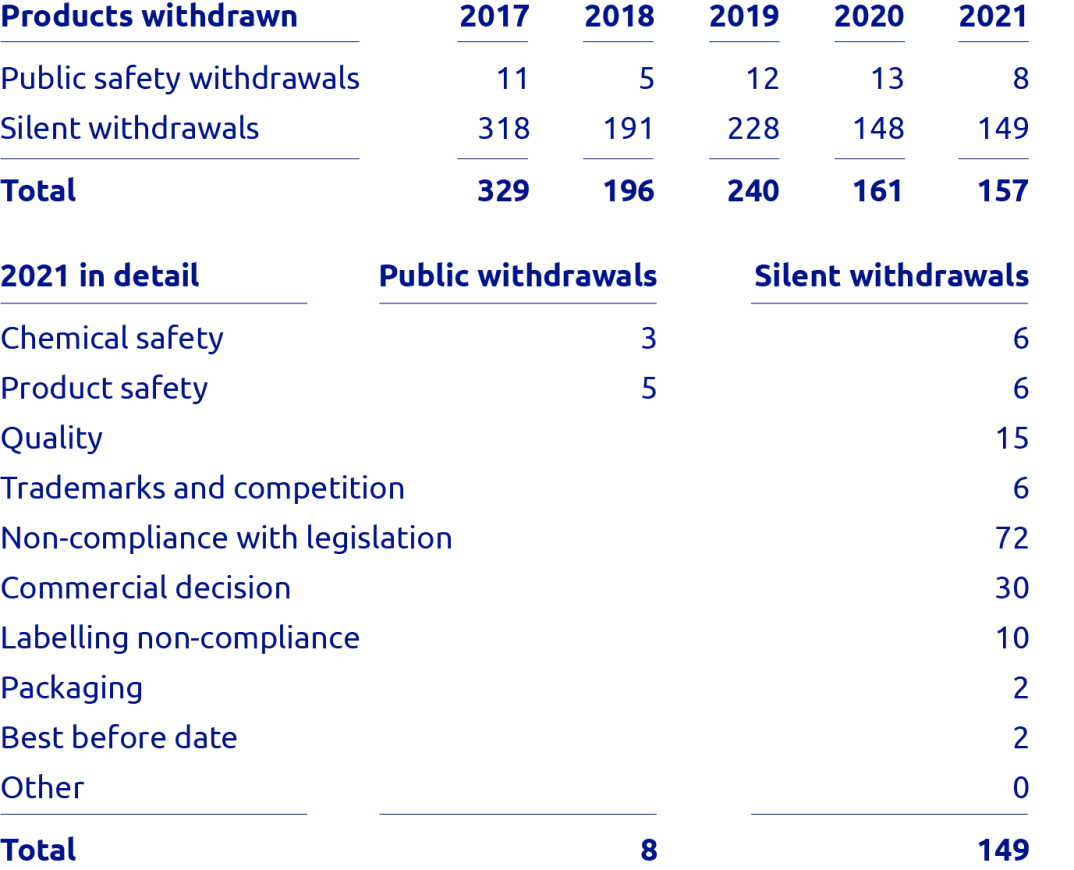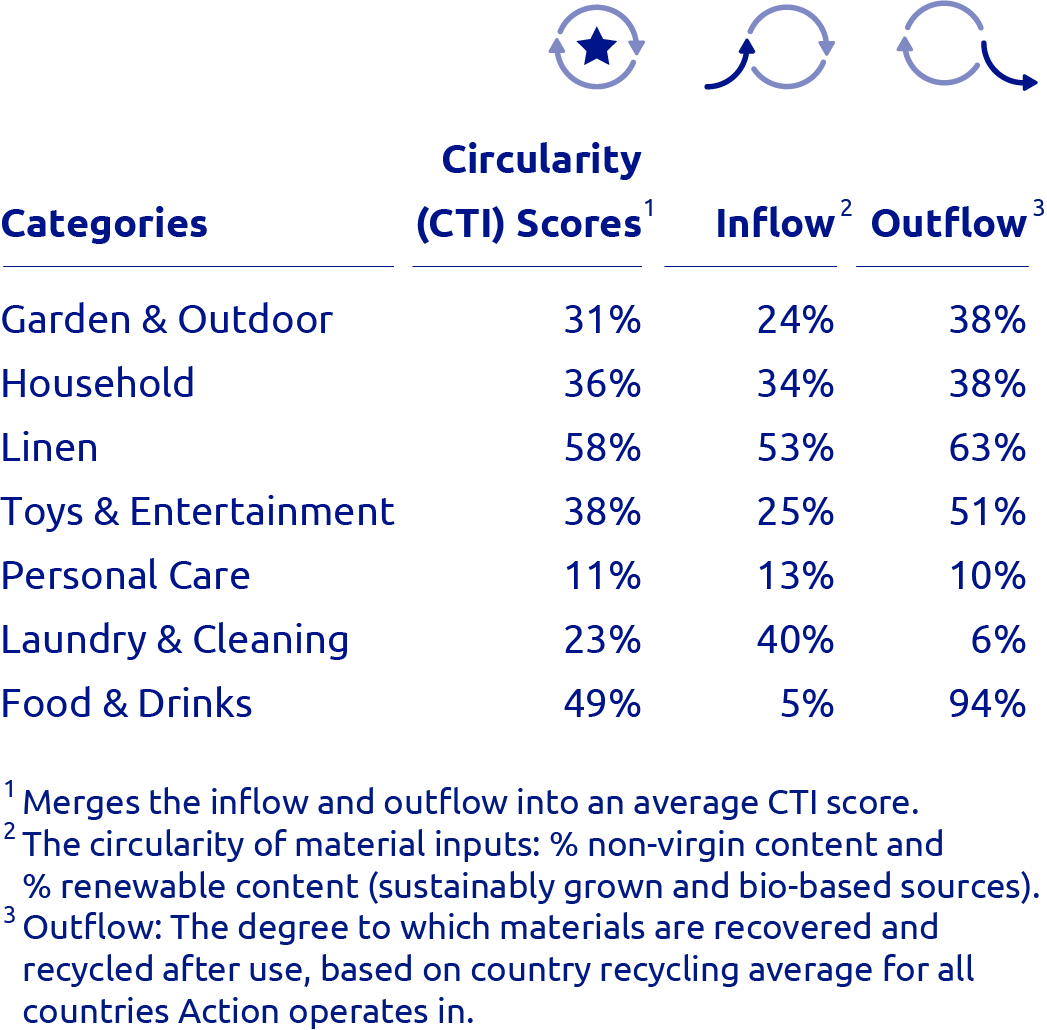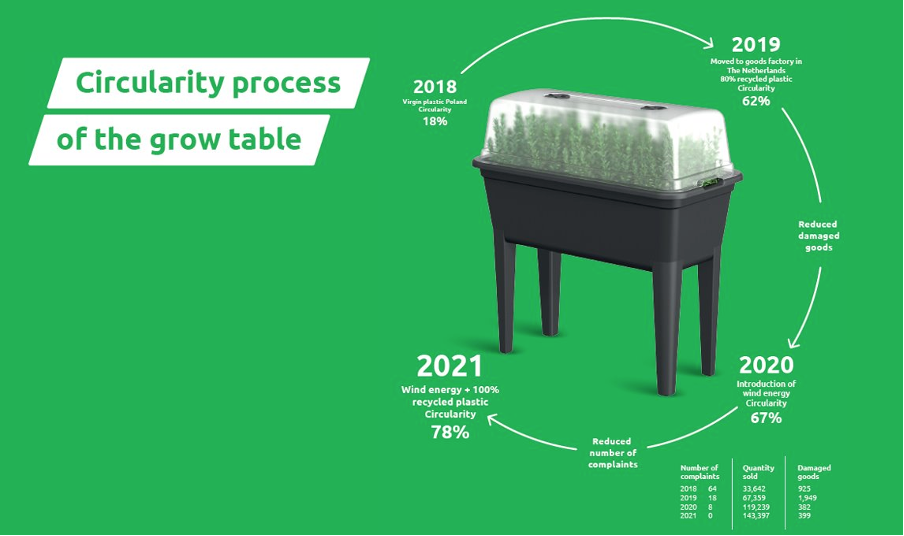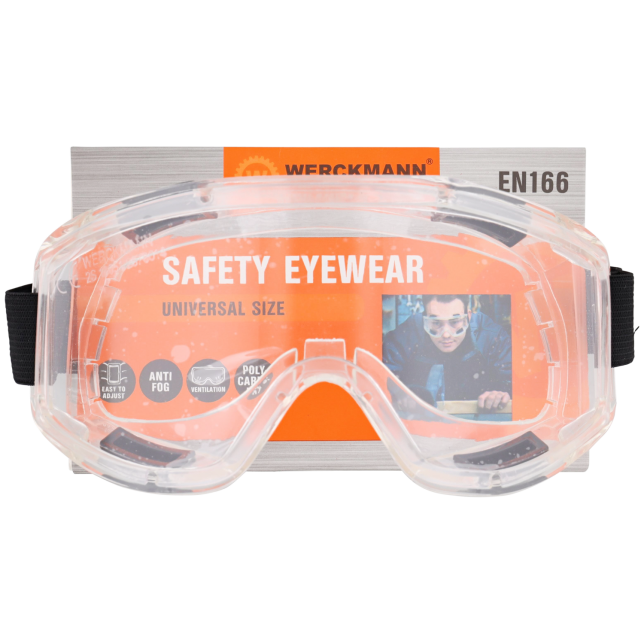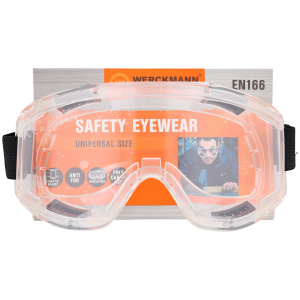welcome
about action
action in 2021
SUSTAINABILITY
PEOPLE
planet
product
partnership
future
governance
appendices

Product safety

Packaging

Social compliance

Product circularity

Our sustainability policies

Our international supply chain
CONTENT PRODUCT PILLAR
Every day Action

‘The materials we use to manufacture our products and packaging are becoming increasingly scarce and more expensive. We need to ensure we manage the raw materials we have in a responsible manner. Reusing materials offers many possibilities.’ Ceriel Franken, Garden & Outdoor buyer
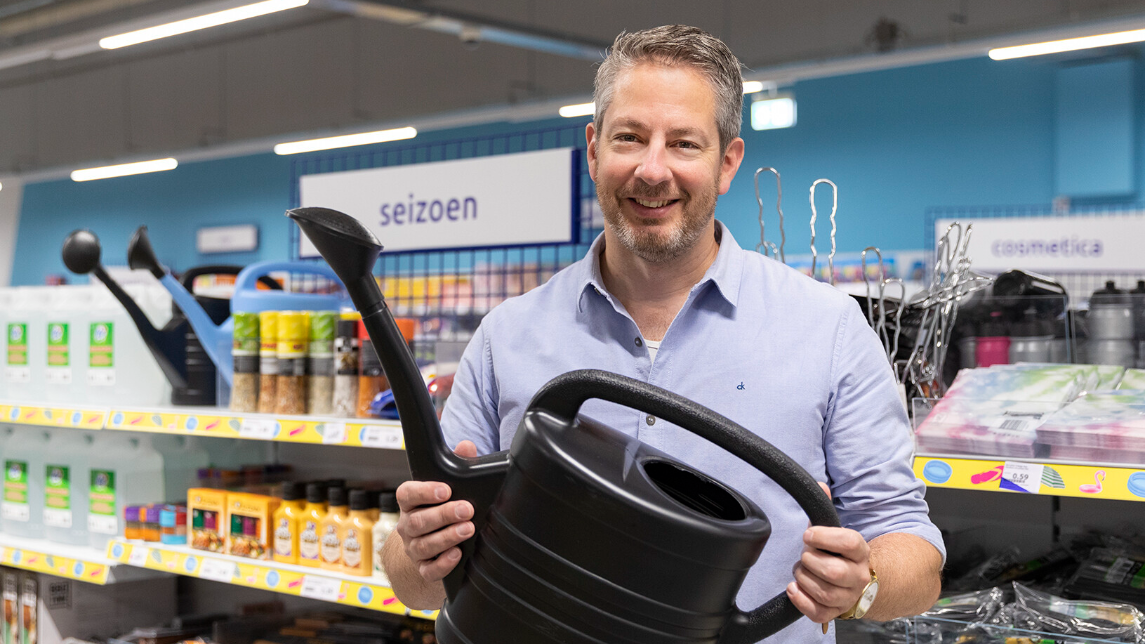
Action wants to offer products that go beyond compliance with safety and quality standards. We want products that are sourced responsibly and offer good value for money. To live up to our environmental and social ambitions, we have developed a roadmap and a set of sustainability policies.
With a broad assortment, complex supply chains and multiple sourcing models it is necessary for us to have greater insights into our manufacturing base. A greater level of supply chain transparency gives us a better understanding of important social conditions such as labour conditions and health and safety.
In 2021, in the face of the ongoing COVID-19 pandemic, we still managed progress towards higher levels of transparency. And despite some challenges such as container ships getting stuck and a shortage of raw materials, we still managed significant growth in terms of stores and sales. All thanks to the commitment, perseverance and confidence of both our employees and our suppliers. This has required a great deal of resilience and flexibility from everyone.
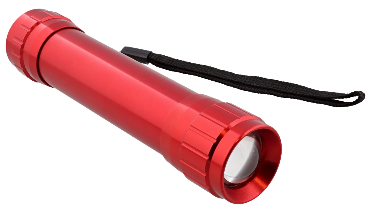
- 80% of private label suppliers engaged and 452 factories mapped for supply chain transparency
- First 7 category circularity scans completed in partnership with Circle Economy
- >86% of our cotton was sourced more sustainably, exceeding our 2022 goal in 2021
- >70% of our timber was sourced more sustainably, meeting our 2022 goal already in 2021
Action’s supplier network consists of 624 suppliers, of which 132 supply us directly. These 132 suppliers source from 485 factories. We want to deliver the same level of transparency into our non-direct operations. Here we work with 492 EU-based wholesalers and we currently have supply chain transparency with 87 of them. In 2022 we will continue to prioritise total transparency of our supply partners which source our private label articles.
Our team of buyers play a key role in enabling us to offer a broad, surprising range of products. Growing numbers of suppliers and products lead to higher demand for quality standards, processes and testing requirements. That is why we have a quality and sustainability team, which doubled in size in 2021. Equally, at our headquarters, we added new roles in the EU compliance team as well as packaging and social compliance roles in the sustainability team. We also recruited compliance managers in Germany, Belgium and Poland.
Our products come from all over the world, with half coming from China and 38.8% from Europe.
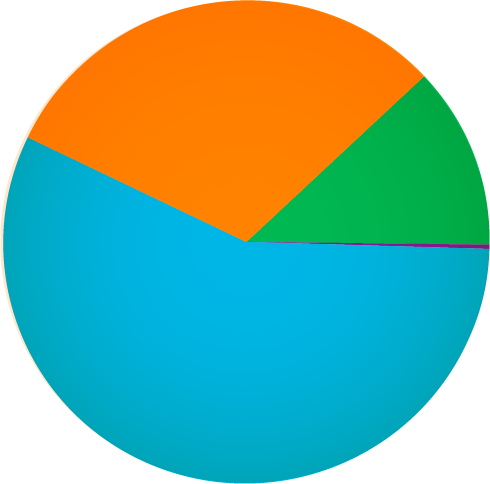
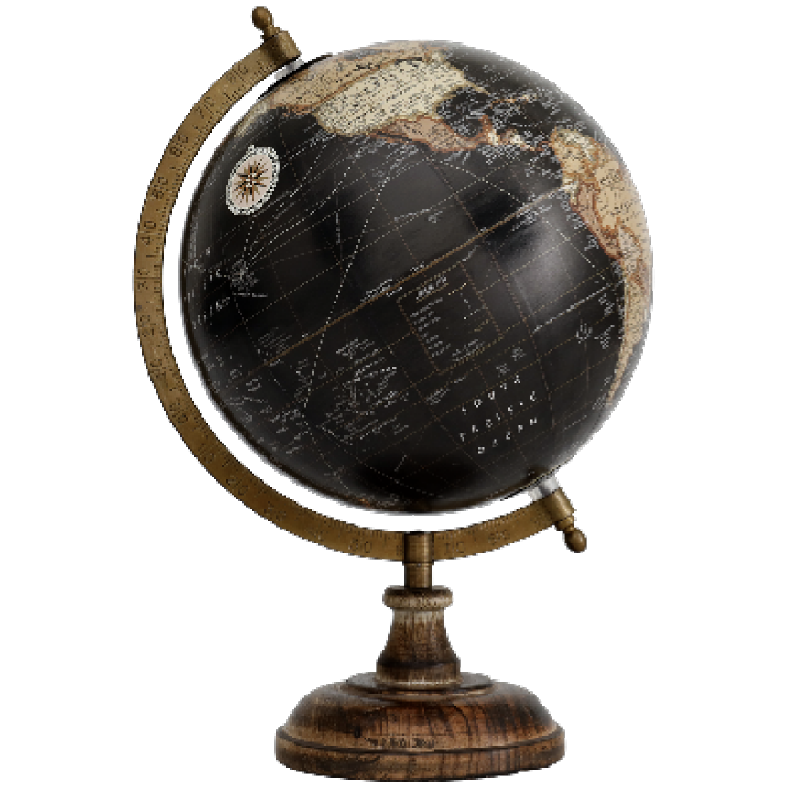
based on share of sales

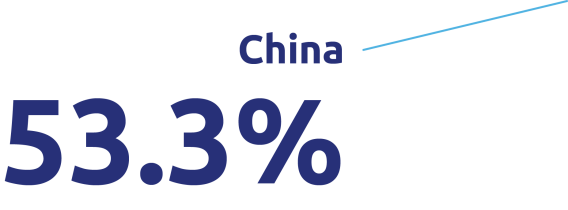


Tamara Veldboer Business Strategies lead at Circle Economy.
“The strength of our collaboration is the combination of our circular expertise with Action’s hands-on mentality. By making circularity practical, specific and actionable, buyers get the knowledge and tools they need to apply circularity. This leads to a product assortment that continues to be high value and low priced - and more sustainable. It’s about a change of mindset.”

We have embraced the circularity philosophy for two reasons; the recognition that industry cannot continue to rely on finite non-renewable resources and for a clear direction to our raw material management. In a circular economy, resources are used in a regenerative way, rather than a linear one. In 2020, we started a collaboration with impact organisation Circle Economy to generate companywide insights into where we stand on circularity. With practical and scalable insights and solutions, Circle Economy supports the circular transition of Action. This provides good insight into where we can make the largest positive circularity contribution. As a retailer, it comes as no surprise that our products are the largest impact contributors. Therefore, we decided to take a category and product specific approach, assessing how circular our 14 categories are by conducting a baseline assessment per category, with the ambition to complete all categories by the end of 2022.
Using the Circular Transition Indicators (CTI) framework, in 2021, we developed category specific circularity plans for half of our product categories.
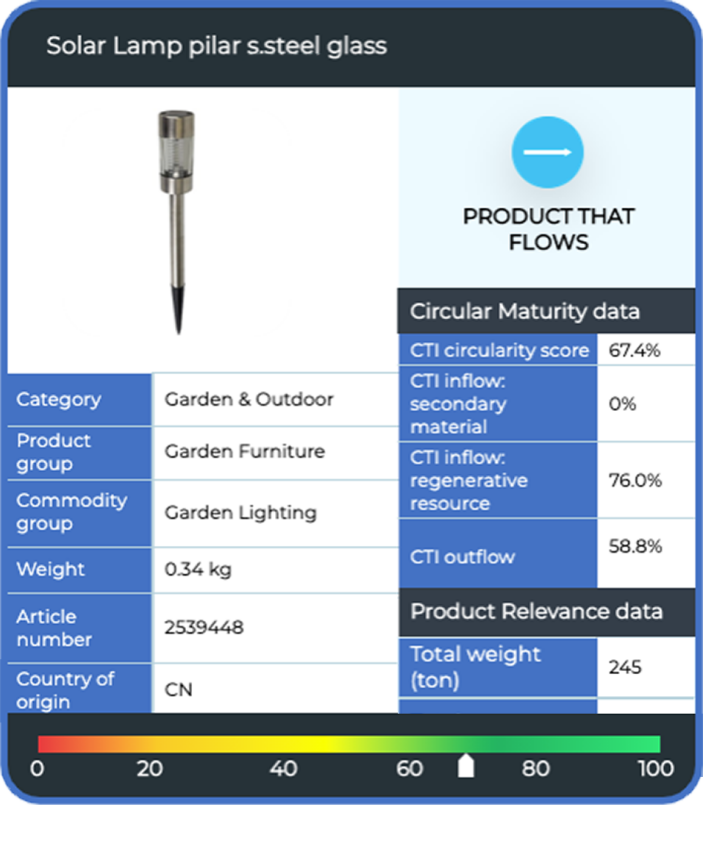
Every day Action

Our improved grow table went into production. Building on all lessons learned in the past years, this latest version is both smaller and made of 100% recycled plastic.
In the past years, we have prioritised timber and cotton, in our efforts to create positive impact for the raw materials we use across our 14 categories.
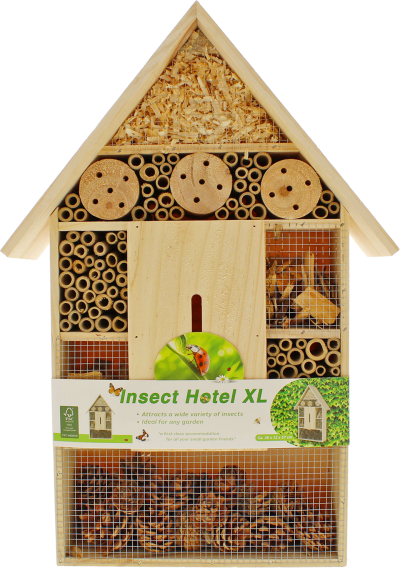
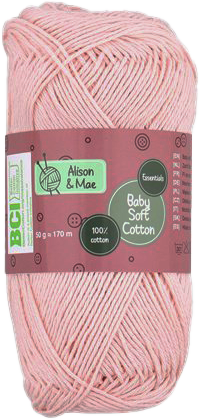
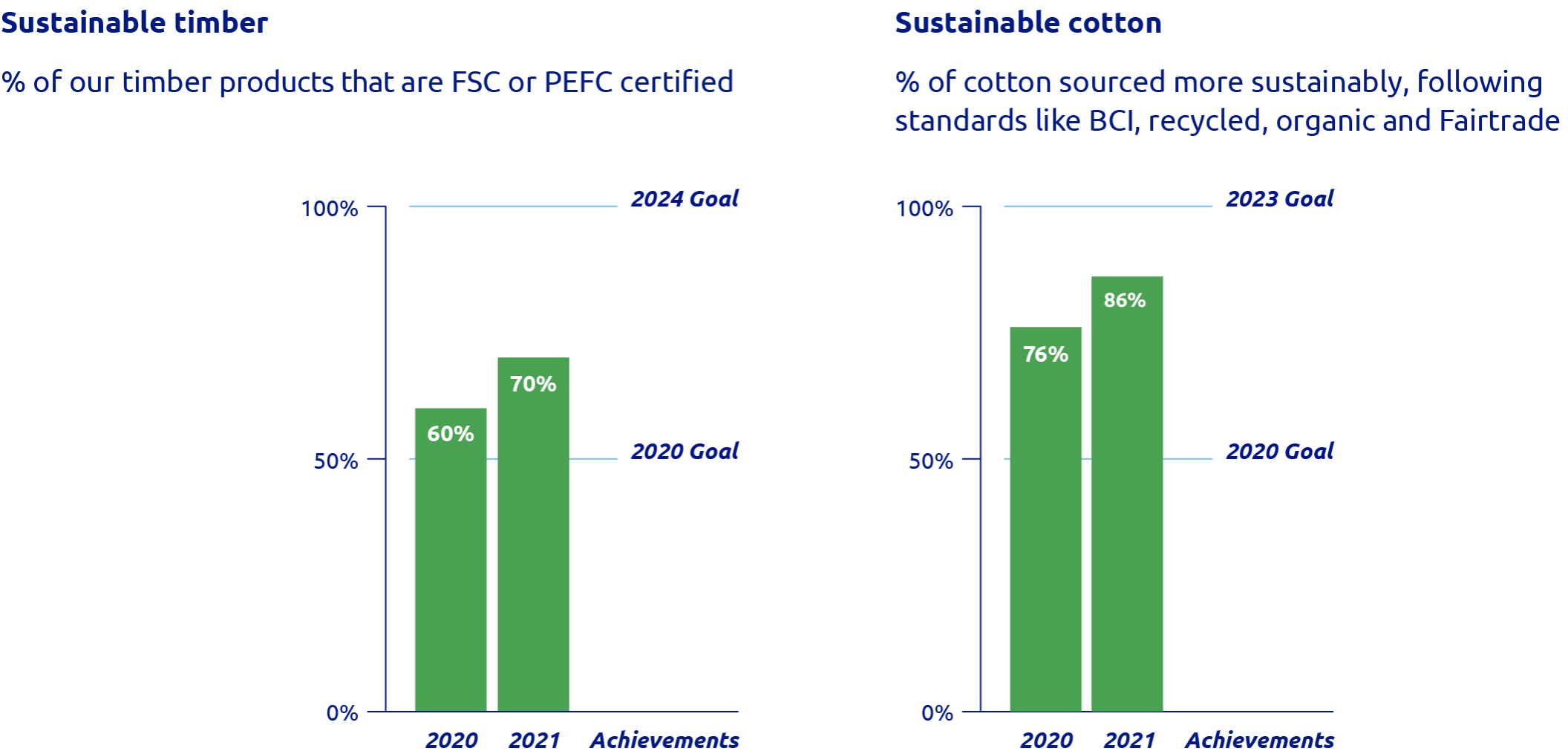
We are increasingly looking at other raw materials sourced for our products that can make a large positive social or environmental impact.
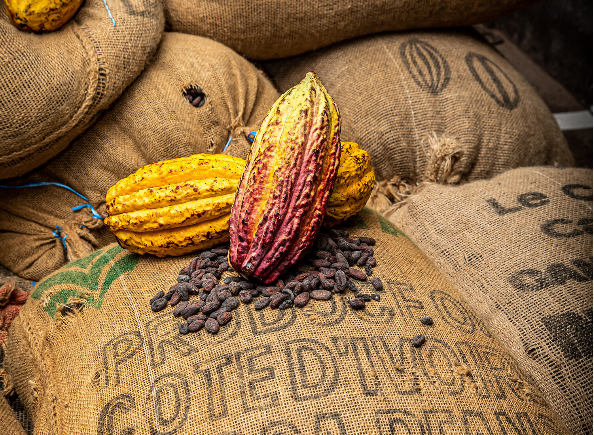
As a retailer with more than 12 million customers every week, we have an impact on our customers’ product choices and a duty to inform them of sustainable alternatives. We are increasingly able to offer our customers more certified sustainable products. Customers can find more and more products with sustainability labels on our shelves: FSC and PEFC for timber products, Fairtrade for chocolate, Rainforest Alliance for coffee and OEKO-TEX for textiles.

Transparency on our supply chain allows us to monitor social compliance and identify risk hotspots across the wholesalers and manufacturers producing for Action. This in turn enables us to strengthen our suppliers and create positive social change. Our target for social compliance is to have 100% transparency by 2025 for all private and white label products.
All our suppliers are required to accept and commit to our Ethical Sourcing Policy. It lays the foundation for the responsible sourcing of products, both for direct and indirect imports. The key elements of our Ethical Sourcing Policy are drawn from the International Labour Organisation conventions, the UN Guiding Principles on Business and Human Rights, and the Business Social Compliance Initiative (BSCI) Code of Conduct. We will publish our revised Ethical Sourcing Policy in 2022.
- No child labour
- Young workers under 18 years of age will not be employed at night or be exposed to any risks
- Employment is freely chosen
- Freedom of association and collective bargaining
- Safe and hygienic working conditions
- Fair wages
- Working hours are not excessive
- No discrimination
- The privacy of workers will be respected
- Employment practices will be in line with national law and shall not exploit workers
- No harsh or inhumane treatment
- Protection of the environment
- Ethical business behaviour (no corruption, no bribery, no blackmailing)
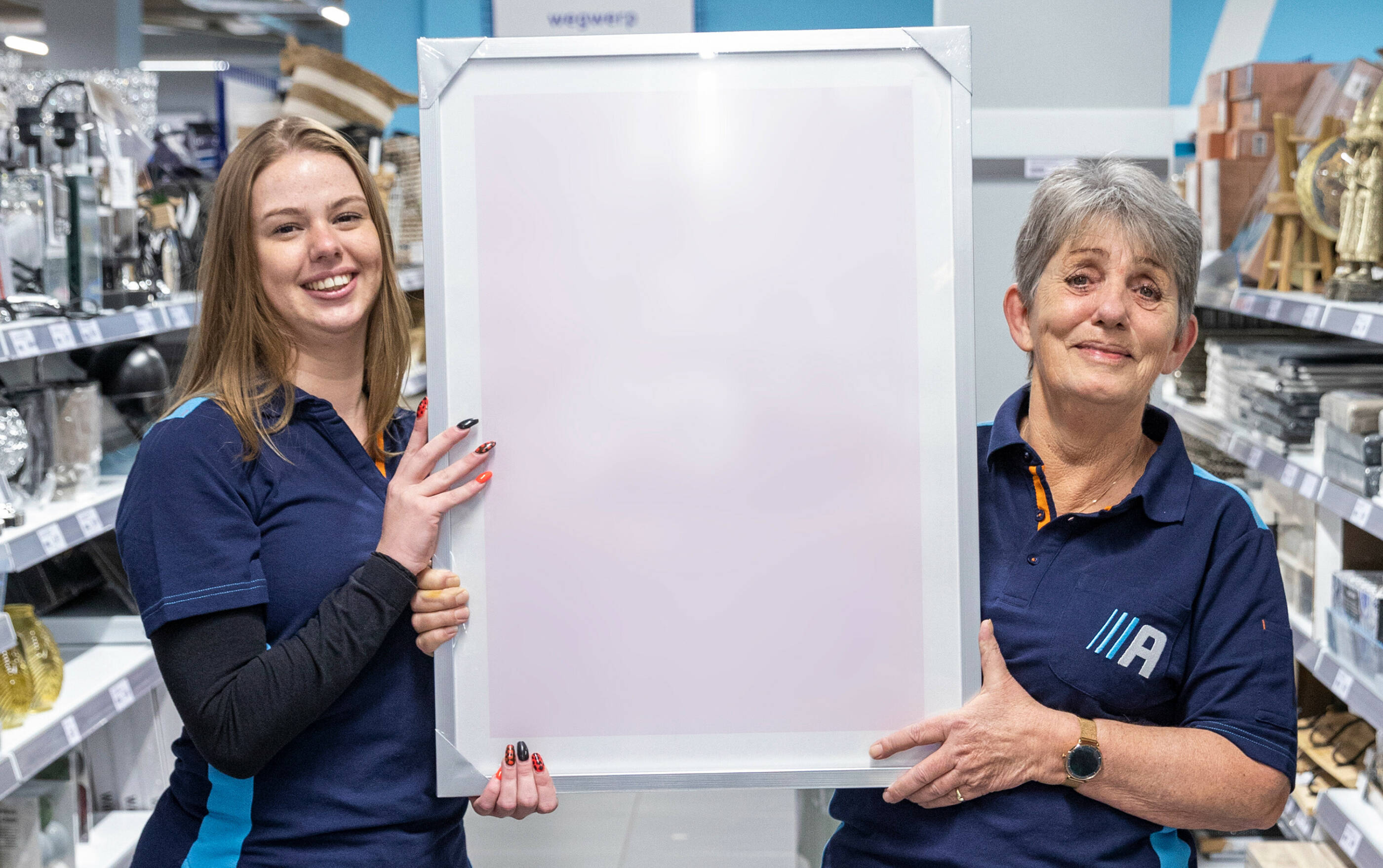
Due to our broad assortment, supply chain mapping is quite challenging. To improve our intelligence on our supply chain further, in 2021, we started a collaboration with ImpactBuying (formerly known as Supply Chain Information Management or SIM). Through their platform, we generate insights across our private label supply chain, including both wholesale suppliers and the underlying product manufacturers.
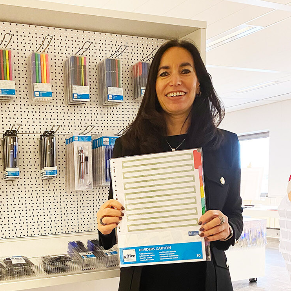
Monique Wurms, DLP Industry B.V.
“Action likes to do business with us because of our professional services and because of our creativity with which we are always able to come up with surprising products. We also partner with Action on supply chain transparency as we are fully aware of the social and environmental responsibility we have.”
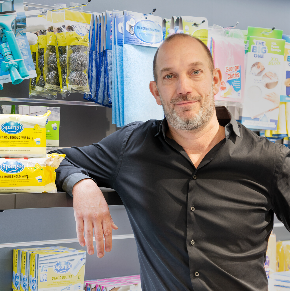
Rogier van der Vat, Dayes Europe B.V.
“We are pleased to partner with Action on social and environmental aspects. Our motivated team and business partners work these aspects every day. Through our collaboration we deliver sustainable products to Action’s customers. We look forward to continued growth and positive impact with Action.”
Every year independent third parties audit the factories that work for Action. This ensures our factories comply with our Ethical Sourcing Policy. Our preferred alignment is towards the BSCI Code of Conduct, but to avoid auditing fatigue, we do accept a further four internationally recognised social and ethical standards: SA8000, SMETA, WRAP and ICTI.
In 2021, the rating of our supplier base improved overall, as well as on critical escalation topics. There were 121 factory audits of new suppliers and 288 renewal audits of existing suppliers.
Like in 2020, COVID restrictions made it more difficult for us to interact with our suppliers. This especially impacted the audits, which are usually done by actual visits. In some cases, we needed to conduct the audits online instead of on-site.

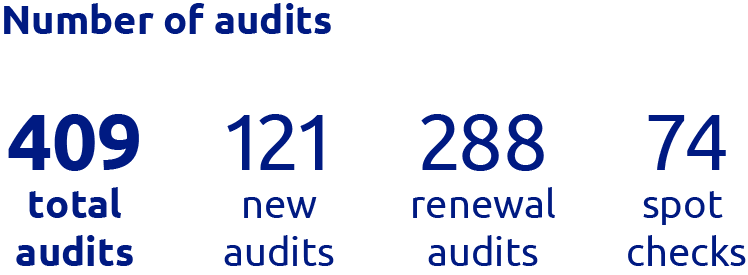
Every day Action

“In close collaboration with our suppliers, we replaced our plastic and cardboard phone case packaging with smaller cardboard only packaging, made of 100% renewable materials. This not only saves 4,800 kg of plastic and 3,525 kg of cardboard per year, but also enables our customers to feel and test the phone case.” Nora Oumoulid, Junior Buyer.
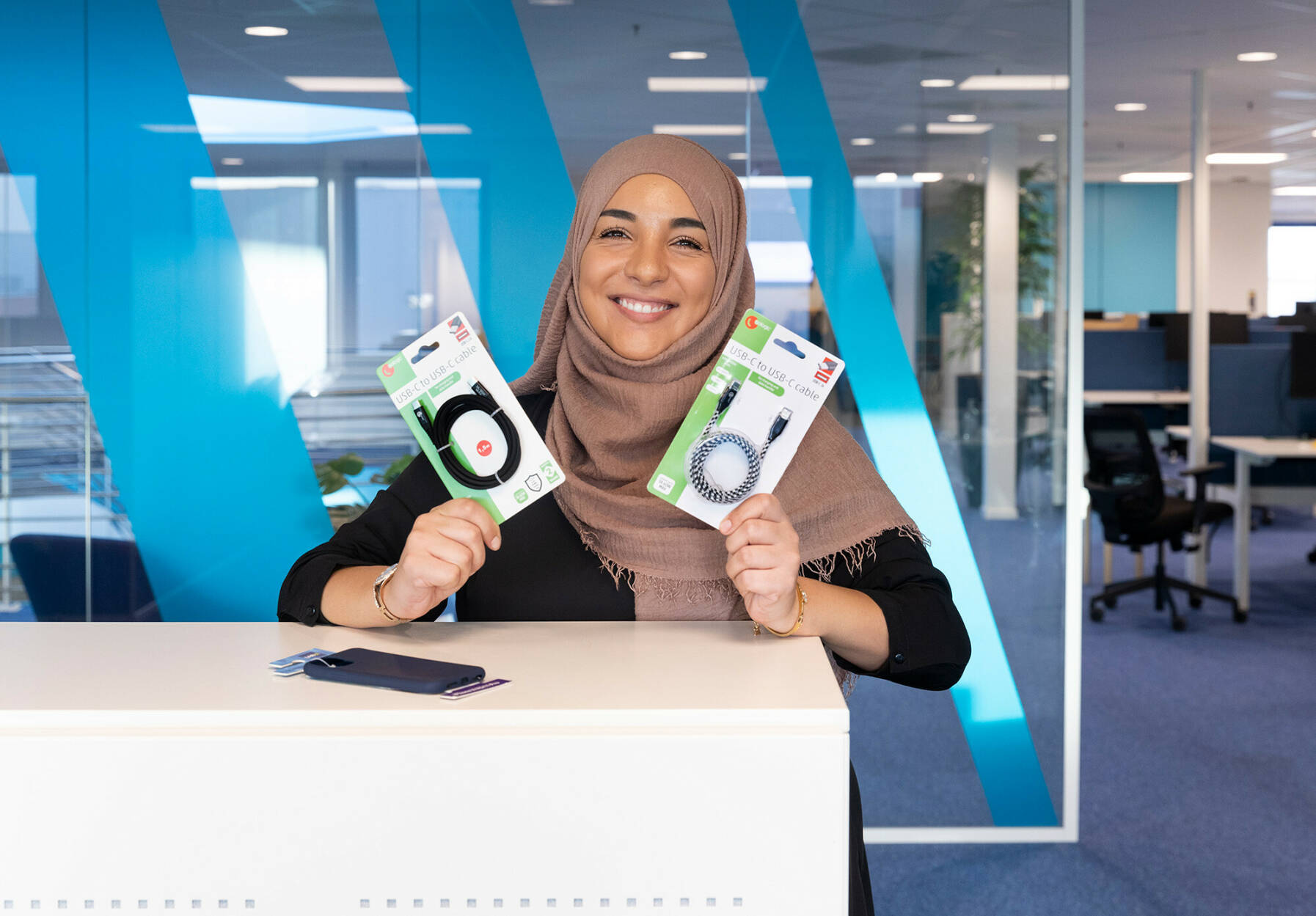
- 25% less packaging by 2025 (compared to the 2019 baseline)
- 100% of private label packaging recyclable by 2022
- 100% of all packaging recyclable by 2025
As our products come from all over the world, making and using different packaging heavily impacts these manufacturing processes. Along with our packaging policy, we developed a Supplier Packaging Best Practice Guide. The environmentally friendly packaging has become an integral part of our negotiations when buying products. In 2021, we made great progress towards these targets.
The production and disposal of packaging material presents an enormous challenge to the environment. In January 2021, we launched our packaging policy – which applies to both our product and transit packaging. The aim of the policy is to reduce the negative social and environmental impacts of packaging within our supply chain. By reducing the amount of packaging waste and establishing circularity in all packaging. Our key targets are:

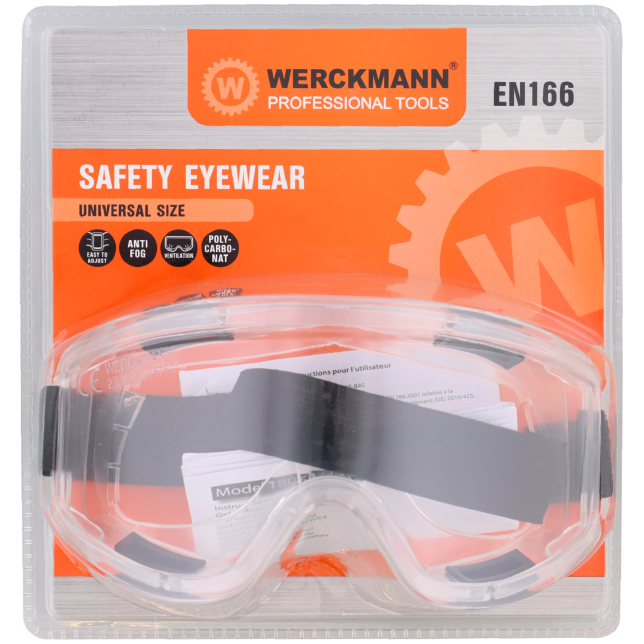
Old packaging
Cardboard & plastic
Old packaging
Cardboard & plastic
To make our packaging more recyclable for our private label products, we will phase out black plastic by end of 2022.This involves avoiding virgin plastic and using only transparent and coloured PET to make sure that all our plastic packaging is recyclable.
The reduction target of 25% by 2025 is based on weight, and is against our baseline year of 2019. We will focus our efforts on reducing plastic packaging as much as possible. As we convert plastic articles to cardboard, we may have to increase the total packaging weight to maintain product protection, but we are confident we can still deliver the total reduction target.
Changed black coloured plastic bottle into transparant 100% rPET bottle

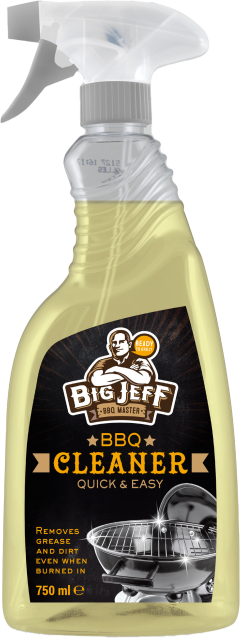
New
Ban PVC as packaging material, changed PVC pack into cardboard packaging

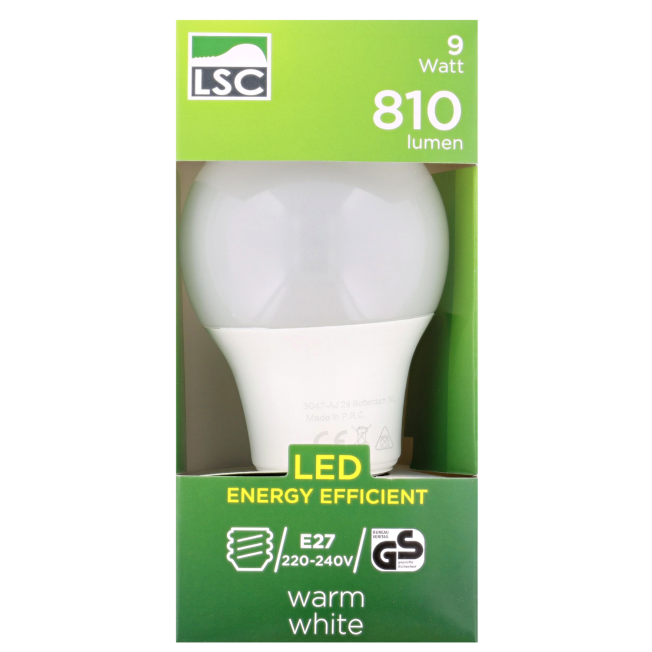
New
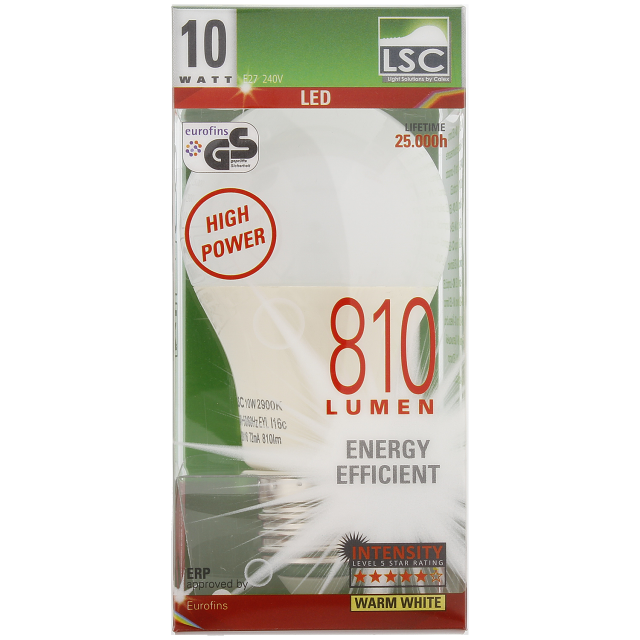
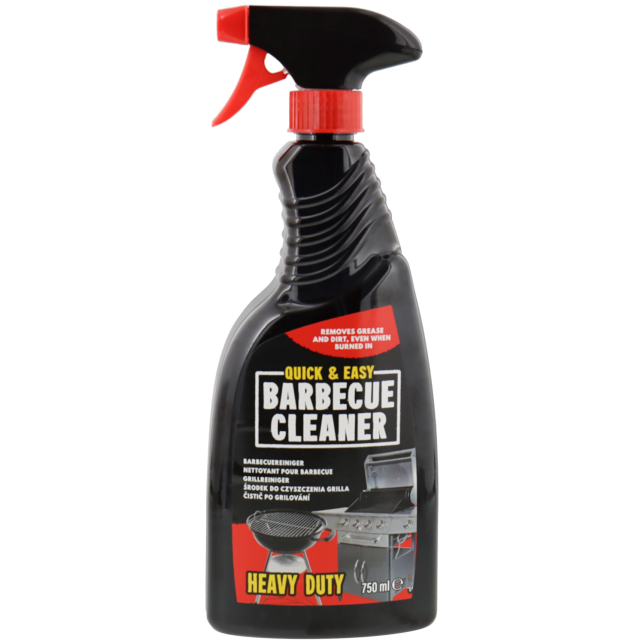
Old
Old
Product safety and quality are also key to our sustainability strategy. We ensure all of our products are safe to use and that they comply with all relevant safety regulations and norms. But this priority goes far beyond product compliance. Good quality products contribute to safety, and as they last longer, they also cause less waste. Nevertheless, we have different safety and quality processes in place, from the beginning to the end of the buying process. To support these processes and to clarify our standards with our manufacturers and importers, we have detailed Product Specification Sheets.
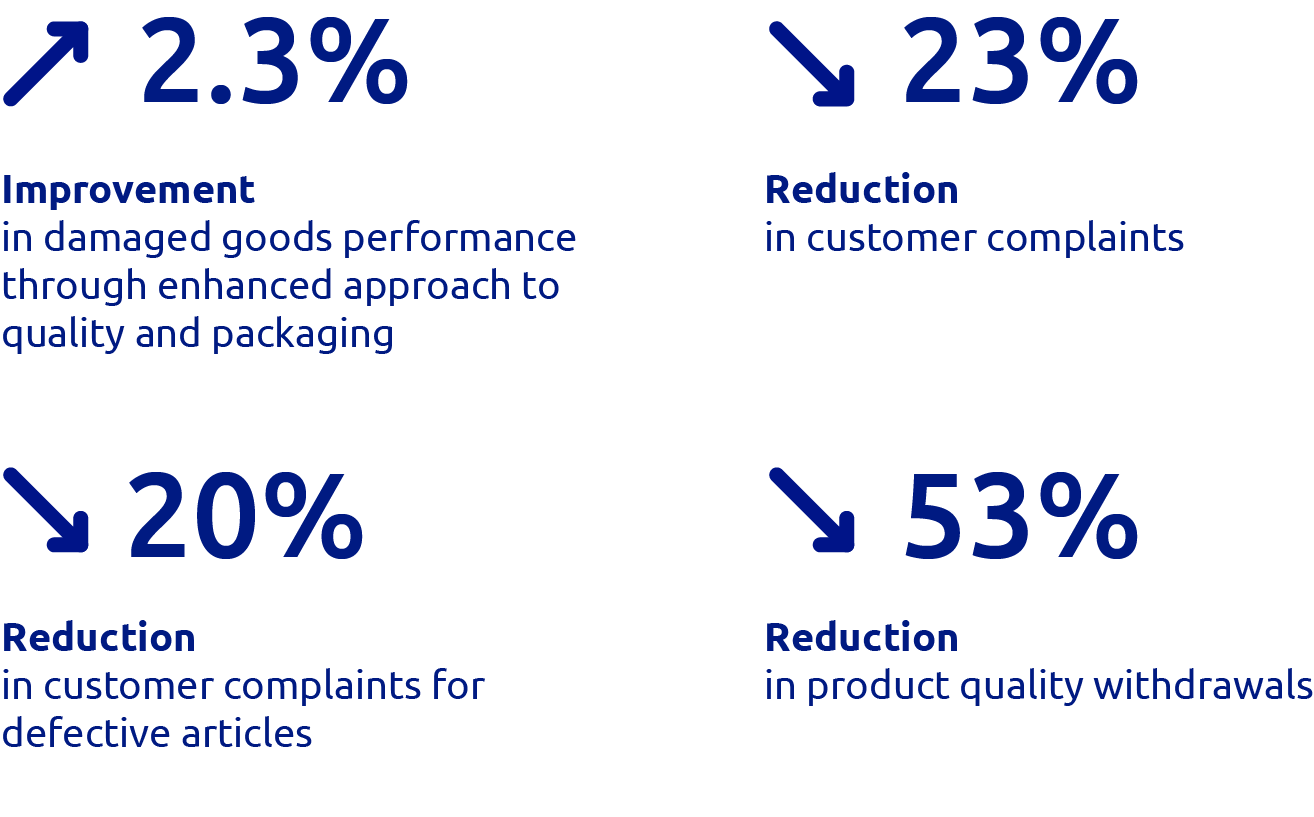


Plastic is a material that has various functions and many benefits. However, it can have significant negative impacts on the environment when it is not recycled. We are aware of the impact plastic can have, and therefore we are constantly searching for ways to reuse plastic in our products and to reduce our plastic footprint. We know there is a long way to go in reducing and reusing plastics. That is why we consider this a journey we are on together with our suppliers and partners.
As of July 2021, the European Union no longer allows certain single use plastic products such as straws, food containers, champagne glasses and wet wipes. We stopped selling these single-use plastic items in 2020. Through proactivity and collaboration with our suppliers, we were able to replace these products with sustainable alternatives.
To underline our ambition on plastic, in 2022, we will add a specific plastic policy in line with our circularity ambitions, including our commitment to source more recycled and renewable plastic.
In 2021, we added a cocoa policy with concrete targets and a strategic action plan for our own brand chocolate products. The target is to have 100% Fairtrade cocoa for our own brand chocolate products by the end of 2023. Through this commitment, we want to provide cocoa farmers with a better income, dignified working conditions and the possibility to invest in their communities. At the same time, we want to ensure good farming practices which mitigate any harmful effects on soil and biodiversity. Fairtrade offers us transparency in addition to farmer benefits and allows us to make a measurable impact.
In 2021, we sold close to 400 tonnes of products with Fairtrade cocoa, generating €85,000 of Fairtrade premium for the cocoa farmers.
"Action's commitment to work with Fairtrade to improve the income of cocoa farmers is a great but also necessary step. The price of cocoa in West Africa has been under pressure for years and millions of cocoa farmers have suffered as a result. We now see that more and more retailers and brands are opting for Fairtrade cocoa and the category is growing by double digits every year. Also, Action sets a good example that the bar must be raised in the industry," Peter d'Angremond, director Fairtrade Netherlands.
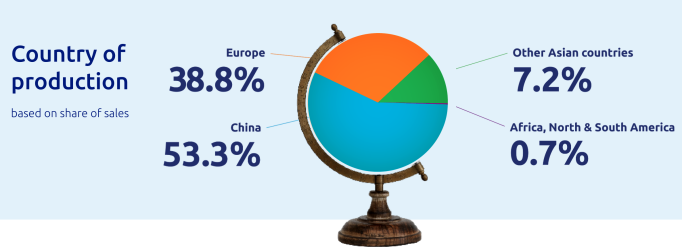
based on share of sales
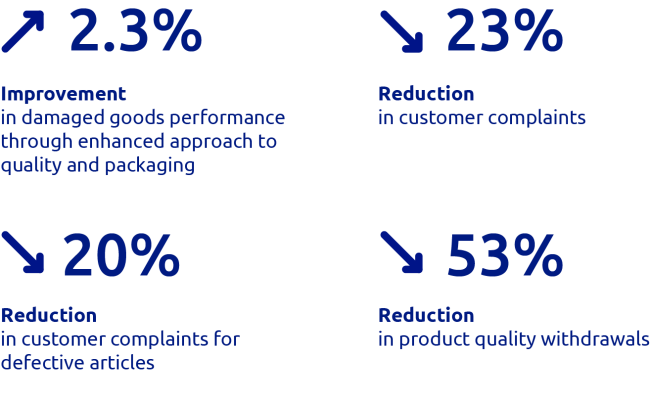

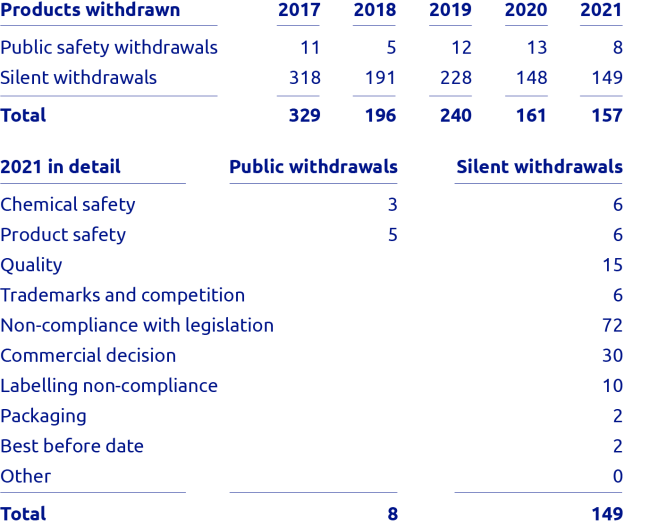
Product safety and quality are also key to our sustainability strategy. We ensure all of our products are safe to use and that they comply with all relevant safety regulations and norms. But this priority goes far beyond product compliance. Good quality products contribute to safety, and as they last longer, they also cause less waste. Nevertheless, we have different safety and quality processes in place, from the beginning to the end of the buying process. To support these processes and to clarify our standards with our manufacturers and importers, we have detailed Product Specification Sheets.
Throughout 2021 we have collaborated extensively with the company Product IP to start building technical files on all our private labels. Product IP are a leading product compliance partner supporting us in improving the completeness and consistency of technical files. We are committed to delivering complete transparency of these files by the close of 2022. This complements our existing collaboration with TÜV Sud and TÜV Rheinland which ensures all testing and technical files for our direct import articles are completed exclusively through them.
Despite our efforts to prevent quality and safety issues, every year we have to withdraw products. We do this either because the quality of a product falls short of standards agreed with the manufacturer, or due to regulatory or intellectual property considerations. We have distinguished “public safety withdrawals” and “silent withdrawals”. A public safety withdrawal usually involves a potential risk to the health and safety of our customers, which leads us to ask our customers to return the products to the stores. Silent withdrawals have different – often technical or organisational – causes, including the clearance of unsold products at the end of a season, products with a labelling deficiency or products that do not meet our quality standards.
In 2021, we withdrew 157 products from our stores, slightly lower than the 161 withdrawals in 2020. Eight of these were public safety withdrawals, executed in close collaboration with the relevant authorities. The others were silent withdrawals. We are committed to lowering these withdrawals year on year – for example, by improving our product labelling, leading to fewer associated withdrawals.
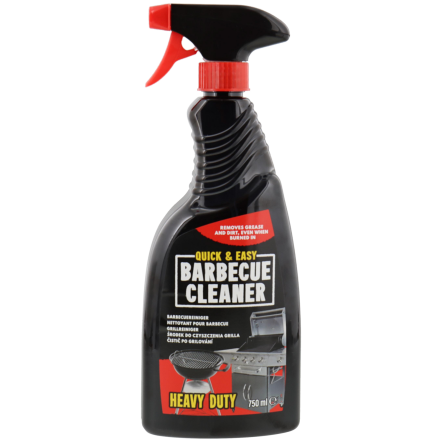
Old
Changed black coloured plastic bottle into transparant 100% rPET bottle

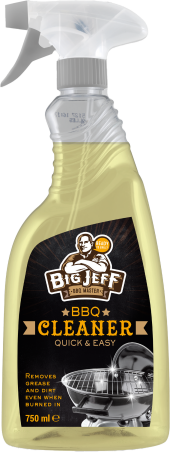
New
Old
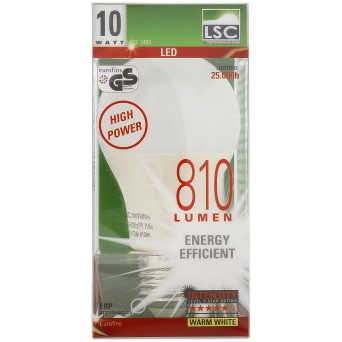
Ban PVC as packaging material, changed PVC pack into cardboard packaging

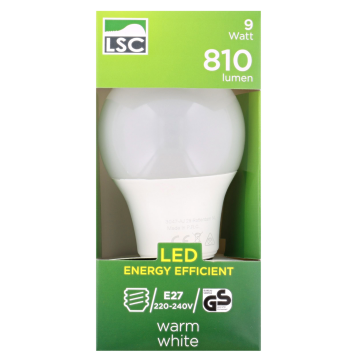
New
To make our packaging more recyclable for our private label products, we will phase out black plastic by end of 2022.This involves avoiding virgin plastic and using only transparent and coloured PET to make sure that all our plastic packaging is recyclable.
The reduction target of 25% by 2025 is based on weight, and is against our baseline year of 2019. We will focus our efforts on reducing plastic packaging as much as possible. As we convert plastic articles to cardboard, we may have to increase the total packaging weight to maintain product protection, but we are confident we can still deliver the total reduction target.
Old packaging
Cardboard & plastic
Old packaging
Cardboard & plastic
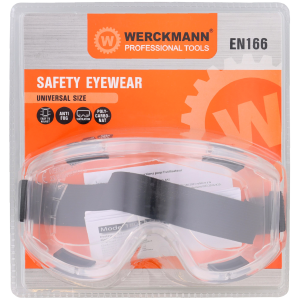

- 25% less packaging by 2025 (compared to the 2019 baseline)
- 100% of private label packaging recyclable by 2022
- 100% of all packaging recyclable by 2025
As our products come from all over the world, making and using different packaging heavily impacts these manufacturing processes. Along with our packaging policy, we developed a Supplier Packaging Best Practice Guide. The environmentally friendly packaging has become an integral part of our negotiations when buying products. In 2021, we made great progress towards these targets.
The production and disposal of packaging material presents an enormous challenge to the environment. In January 2021, we launched our packaging policy – which applies to both our product and transit packaging. The aim of the policy is to reduce the negative social and environmental impacts of packaging within our supply chain. By reducing the amount of packaging waste and establishing circularity in all packaging. Our key targets are:
Every day Action

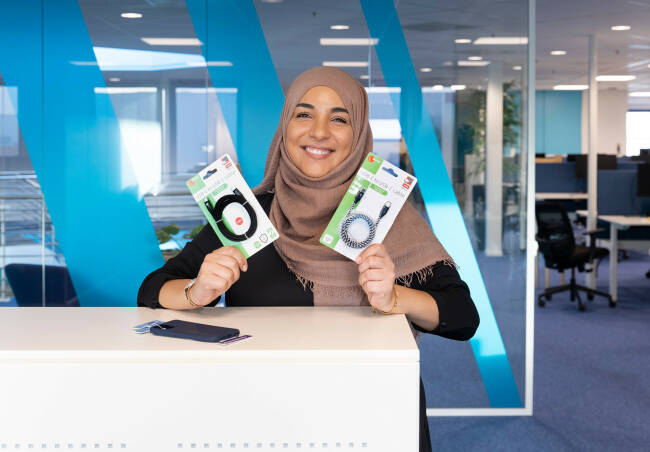
“In close collaboration with our suppliers, we replaced our plastic and cardboard phone case packaging with smaller cardboard only packaging, made of 100% renewable materials. This not only saves 4,800 kg of plastic and 3,525 kg of cardboard per year, but also enables our customers to feel and test the phone case.” Nora Oumoulid, Junior Buyer.

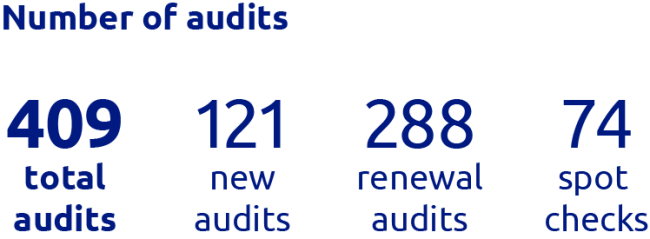
Every direct import partner needs to have a valid, independent, social compliance audit. Renewal audits take place on an annual or biennial basis, depending on earlier audit results. In addition, every year, we conduct spot checks. Out of the 74 spot checks in 2021, 14 identified significant actual and potential negative social impacts, which were mostly related to working hours and health and safety. All these significant actual and potential negative social impacts were remediated.
Of the 409 BSCI factory audits that were conducted in 2021, all 409 factories were rated as A on child labour, as well as on bonded labour. There was one historical child labour case that went through the critical escalation procedure in 2021. At the time of the inspection, the child no longer worked at the factory. We engaged with the factory to improve their internal recruitment process. Their policies were updated and the relevant employees were trained. After a positive review of the corrective actions taken, we decided to continue the relationship with this factory.
Every year independent third parties audit the factories that work for Action. This ensures our factories comply with our Ethical Sourcing Policy. Our preferred alignment is towards the BSCI Code of Conduct, but to avoid auditing fatigue, we do accept a further four internationally recognised social and ethical standards: SA8000, SMETA, WRAP and ICTI.
In 2021, the rating of our supplier base improved overall, as well as on critical escalation topics. There were 121 factory audits of new suppliers and 288 renewal audits of existing suppliers.
Like in 2020, COVID restrictions made it more difficult for us to interact with our suppliers. This especially impacted the audits, which are usually done by actual visits. In some cases, we needed to conduct the audits online instead of on-site.
Rogier van der Vat, Dayes Europe B.V.
“We are pleased to partner with Action on social and environmental aspects. Our motivated team and business partners work these aspects every day. Through our collaboration we deliver sustainable products to Action’s customers. We look forward to continued growth and positive impact with Action.”
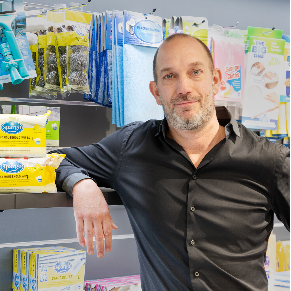
Monique Wurms, DLP Industry B.V.
“Action likes to do business with us because of our professional services and because of our creativity with which we are always able to come up with surprising products. We also partner with Action on supply chain transparency as we are fully aware of the social and environmental responsibility we have.”
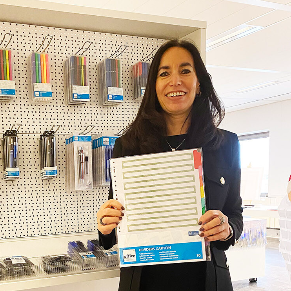
In 2021, we onboarded 121 factories and six direct import new suppliers. Action only starts a cooperation with a factory if an audit is done. In addition, only factories with ratings of C and above are accepted. We want to proactively engage with corrective action plans for any factories slipping below this level. For more information on the factory ratings, read more on the Amfori BSCI website.
- 102 new wholesale suppliers
- 452 factories
- 424 factories compliant with our ESP
- 700 articles
In 2021, we created full transparency for our wholesalers and their tier 1 factories. This helps us understand the risk on social compliance at the factory level. In 2021, we also expanded our team with a Sustainability Manager and a Social Compliance Specialist.
Mapped on ImpactBuying in 2021
Due to our broad assortment, supply chain mapping is quite challenging. To improve our intelligence on our supply chain further, in 2021, we started a collaboration with ImpactBuying (formerly known as Supply Chain Information Management or SIM). Through their platform, we generate insights across our private label supply chain, including both wholesale suppliers and the underlying product manufacturers.
- No child labour
- Young workers under 18 years of age will not be employed at night or be exposed to any risks
- Employment is freely chosen
- Freedom of association and collective bargaining
- Safe and hygienic working conditions
- Fair wages
- Working hours are not excessive
- No discrimination
- The privacy of workers will be respected
- Employment practices will be in line with national law and shall not exploit workers
- No harsh or inhumane treatment
- Protection of the environment
- Ethical business behaviour (no corruption, no bribery, no blackmailing)
Human rights are central to our Ethical Sourcing Policy. In 2021, we conducted four vendor and factory training sessions for our suppliers on our approach, focusing on and reminding them of our commitments. A total of 1,439 people attended these (mostly) web-based sessions.
Our Critical Escalation Policy outlines the procedure to be followed in cases of severe social non-compliance in factories producing for Action. Supplier relations may be terminated in cases of child labour, human trafficking, bribery, unauthorised sub-contracting and bonded labour. If we feel a supplier is not proactively aligned with our ambition and direction, we decide on a course of action on a case-by-case basis. Orders are suspended until a corrective action plan has been successfully implemented.
All our suppliers are required to accept and commit to our Ethical Sourcing Policy. It lays the foundation for the responsible sourcing of products, both for direct and indirect imports. The key elements of our Ethical Sourcing Policy are drawn from the International Labour Organisation conventions, the UN Guiding Principles on Business and Human Rights, and the Business Social Compliance Initiative (BSCI) Code of Conduct. We will publish our revised Ethical Sourcing Policy in 2022.
Transparency on our supply chain allows us to monitor social compliance and identify risk hotspots across the wholesalers and manufacturers producing for Action. This in turn enables us to strengthen our suppliers and create positive social change. Our target for social compliance is to have 100% transparency by 2025 for all private and white label products.
As a retailer with more than 12 million customers every week, we have an impact on our customers’ product choices and a duty to inform them of sustainable alternatives. We are increasingly able to offer our customers more certified sustainable products. Customers can find more and more products with sustainability labels on our shelves: FSC and PEFC for timber products, Fairtrade for chocolate, Rainforest Alliance for coffee and OEKO-TEX for textiles.
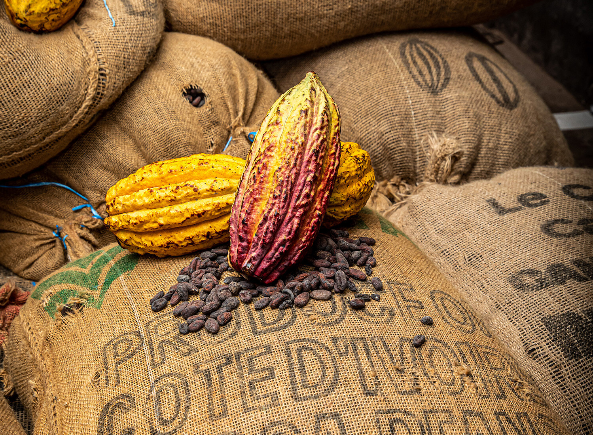
We are increasingly looking at other raw materials sourced for our products that can make a large positive social or environmental impact.
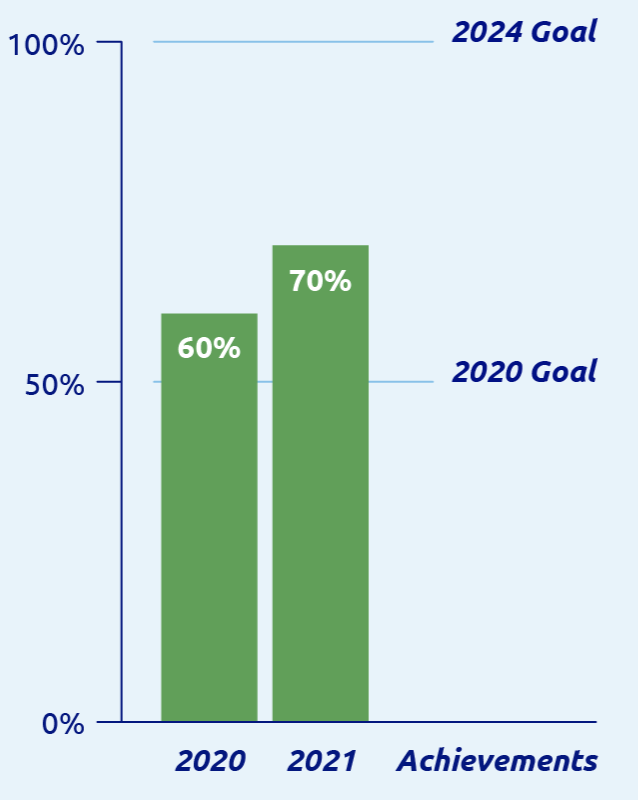
In 2018, we developed a Responsible Timber Products Sourcing Policy that aims to achieve a higher level of transparency, sets goals and define procedures. This ensures that products imported directly or via importers fulfil or exceed the requirements of the EU timber regulations. To implement this policy, we have formed a strategic partnership with the Forest Stewardship Council (FSC). By the end of 2021, 70% of Action’s timber-based products were sourced sustainably – already meeting our intermediate goal of 70% by 2022. We have therefore decided to bring our goal of 100% sustainable timber sourcing forward from 2025 to 2024.
2019:
2020:
2021:
€ 631.267
€ 2.364.465
€ 3.554.223
We aspire to increase our sourcing of more sustainable cotton for our textiles and clothes. Our Responsible Cotton Sourcing Policy includes commitments to critical matters, such as human rights, transparency, water and pesticides management. In 2018, we became a member of the Better Cotton Initiative (BCI) to strengthen our ambition and develop our purchasing of more sustainable cotton. In 2021, Action became one of the top 25 sourcing Retailer & Brand Members. We also had the privilege of joining the Growth and Innovation Fund, through which we hope to create even more meaningful impact for Better Cotton farmers.
By the end of 2021, 86% of Action’s cotton was sourced sustainably, a big jump from 76% in 2020 and exceeding our intermediate goal of 85% by 2022 a year early. Like our timber goal, we have moved our goal of 100% sustainable cotton forward to 2023.
Thanks to our sourcing of Better Cotton in 2021, an estimated 8.7 billion litres of water were saved, and an estimated 5,200 kilos of pesticides were avoided. This also generated an estimated €3.6 million of additional farmer profitability.
% of our timber products that are FSC or PEFC certified
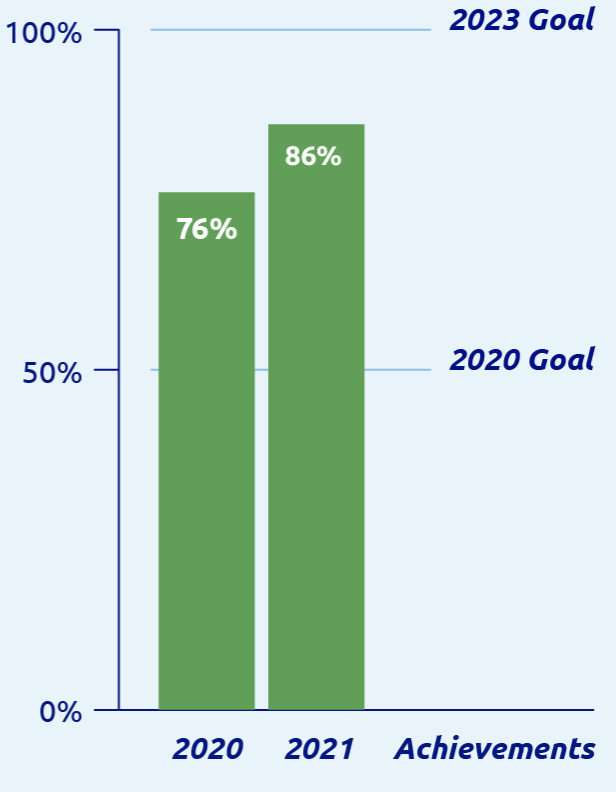
% of cotton sourced more sustainably, following standards like BCI, recycled, organic and Fairtrade
In the past years, we have prioritised timber and cotton, in our efforts to create positive impact for the raw materials we use across our 14 categories.
Every day Action

Our improved grow table went into production. Building on all lessons learned in the past years, this latest version is both smaller and made of 100% recycled plastic.
Tamara Veldboer Business Strategies lead at Circle Economy.
“The strength of our collaboration is the combination of our circular expertise with Action’s hands-on mentality. By making circularity practical, specific and actionable, buyers get the knowledge and tools they need to apply circularity. This leads to a product assortment that continues to be high value and low priced - and more sustainable. It’s about a change of mindset.”

The ‘solar lamp pilar stainless steel glass’ article belongs to the product group of Garden Furniture and commodity group of Garden Lighting. Characterised as a product that flows, it is a relatively simple product designed for decorative purposes in the garden. Based on its robustness in outdoor conditions and battery life, this is also confirmed in limited durability of the product.
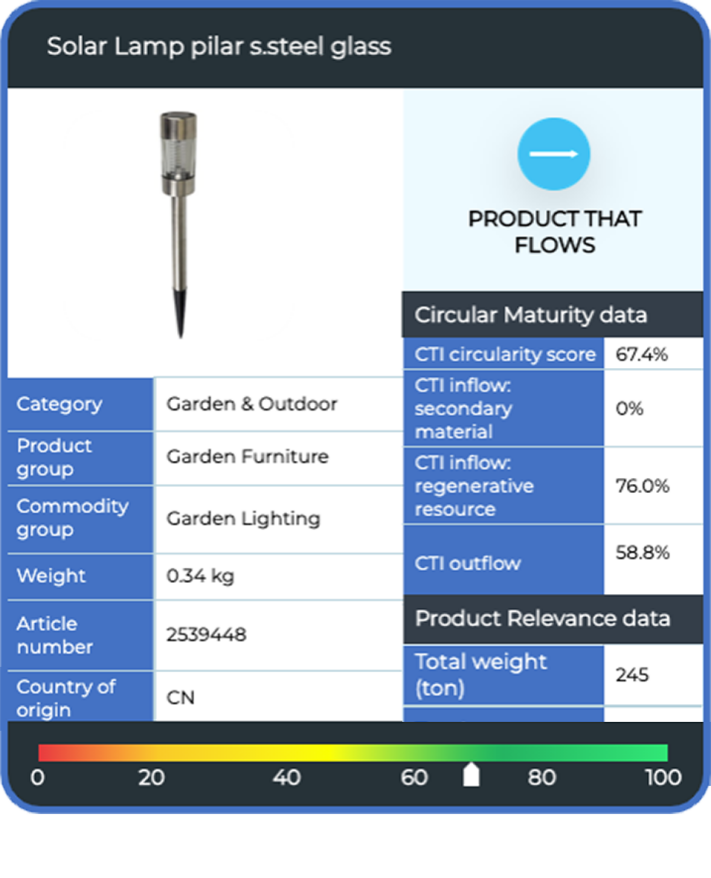
We have embraced the circularity philosophy for two reasons; the recognition that industry cannot continue to rely on finite non-renewable resources and for a clear direction to our raw material management. In a circular economy, resources are used in a regenerative way, rather than a linear one. In 2020, we started a collaboration with impact organisation Circle Economy to generate companywide insights into where we stand on circularity. With practical and scalable insights and solutions, Circle Economy supports the circular transition of Action. This provides good insight into where we can make the largest positive circularity contribution. As a retailer, it comes as no surprise that our products are the largest impact contributors. Therefore, we decided to take a category and product specific approach, assessing how circular our 14 categories are by conducting a baseline assessment per category, with the ambition to complete all categories by the end of 2022.
Using the Circular Transition Indicators (CTI) framework, in 2021, we developed category specific circularity plans for half of our product categories.
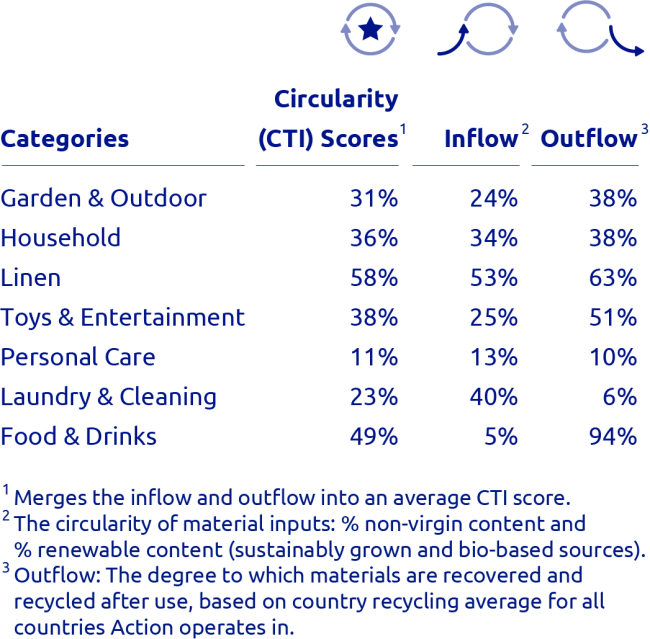
This framework focuses on the circular versus the linear mass that flows into and out of specific products. It assesses both the sustainability of the materials used for products, as well as the recyclability in the countries where we operate. The table shows the baseline circularity assessments for the top 50 fixed products* in each category (based on a combination of sales and revenue).
As the product ranges in all categories are very different from each other in terms of materials used, the category circularity scores cannot be compared. The action plans for each of these categories include improving the circularity of at least five impactful products in their category (based on volume and sales). In addition to completing the scans for the other categories, in 2022, we will also develop a circular buying guide, circularity KPIs and tools, to embed circularity in our business.
* Based on a combination of sales and revenue
For direct imports, nearly all our products come from China; for these imports, we partner with the internationally renowned sourcing company Li & Fung. In addition to our own team on the ground, we work with a Li & Fung team of 88 people dedicated to Action. They help us find exciting new products, which sometimes means finding new suppliers. They also ensure that the factories meet our requirements and policies, including the introduction to our Ethical Sourcing Policy and the implementation of a social compliance programme. If a factory does not comply with our guidelines, we do not work with that supplier.
Due to the impact of the COVID-19 pandemic and the rising shipping prices, we have been exploring opportunities to source more within Europe. Through our sourcing strategy, we will continue to evaluate the most optimal sourcing routes.
Action’s supplier network consists of 624 suppliers, of which 132 supply us directly. These 132 suppliers source from 485 factories. We want to deliver the same level of transparency into our non-direct operations. Here we work with 492 EU-based wholesalers and we currently have supply chain transparency with 87 of them. In 2022 we will continue to prioritise total transparency of our supply partners which source our private label articles.
Our team of buyers play a key role in enabling us to offer a broad, surprising range of products. Growing numbers of suppliers and products lead to higher demand for quality standards, processes and testing requirements. That is why we have a quality and sustainability team, which doubled in size in 2021. Equally, at our headquarters, we added new roles in the EU compliance team as well as packaging and social compliance roles in the sustainability team. We also recruited compliance managers in Germany, Belgium and Poland.
Our products come from all over the world, with half coming from China and 38.8% from Europe.
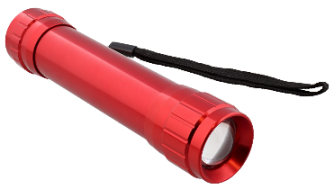
- 80% of private label suppliers engaged and 452 factories mapped for supply chain transparency
- First 7 category circularity scans completed in partnership with Circle Economy
- >86% of our cotton was sourced more sustainably, exceeding our 2022 goal in 2021
- >70% of our timber was sourced more sustainably, meeting our 2022 goal already in 2021

Product safety

Packaging

Social compliance

Product circularity

Our sustainability policies

Our international supply chain
CONTENT PRODUCT PILLAR
With a broad assortment, complex supply chains and multiple sourcing models it is necessary for us to have greater insights into our manufacturing base. A greater level of supply chain transparency gives us a better understanding of important social conditions such as labour conditions and health and safety.
In 2021, in the face of the ongoing COVID-19 pandemic, we still managed progress towards higher levels of transparency. And despite some challenges such as container ships getting stuck and a shortage of raw materials, we still managed significant growth in terms of stores and sales. All thanks to the commitment, perseverance and confidence of both our employees and our suppliers. This has required a great deal of resilience and flexibility from everyone.
Action wants to offer products that go beyond compliance with safety and quality standards. We want products that are sourced responsibly and offer good value for money. To live up to our environmental and social ambitions, we have developed a roadmap and a set of sustainability policies.
‘The materials we use to manufacture our products and packaging are becoming increasingly scarce and more expensive. We need to ensure we manage the raw materials we have in a responsible manner. Reusing materials offers many possibilities.’ Ceriel Franken, Garden & Outdoor buyer
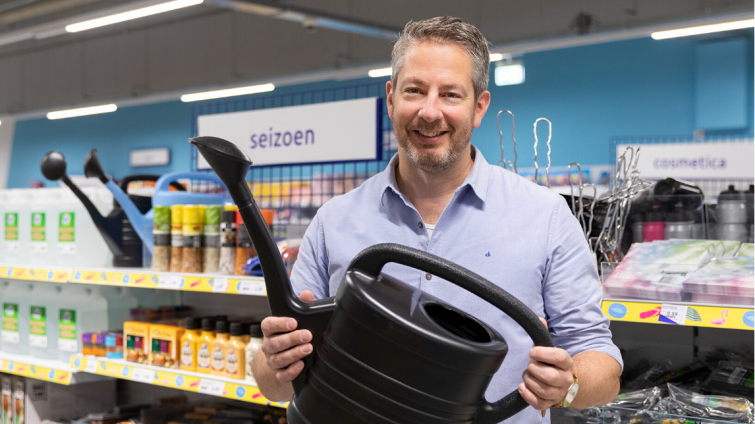
Every day Action


